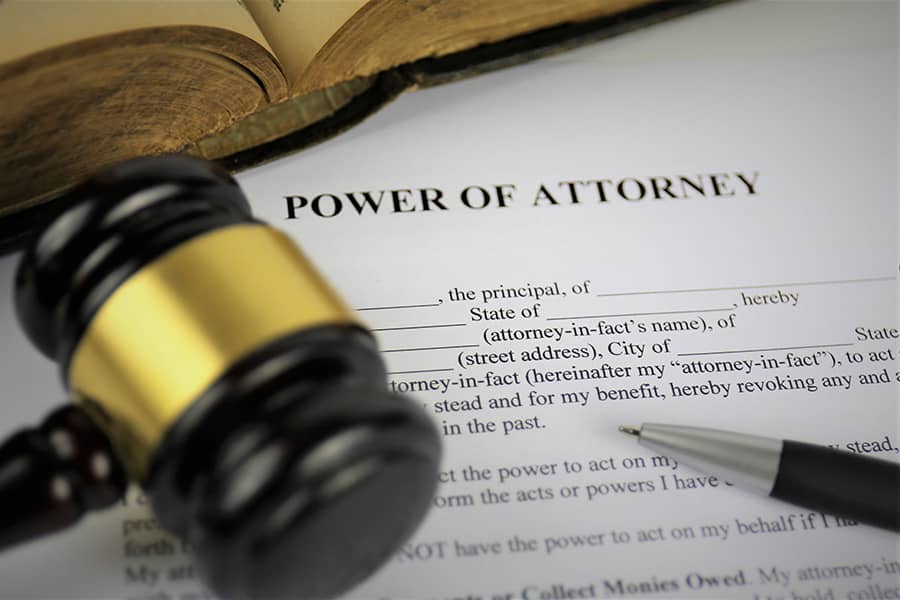Michael S. Simone, Esq.
Managing Attorney

A power of attorney (POA) is a legal document that allows you to appoint someone to act on your behalf in various matters, such as financial, legal, or healthcare decisions. The person granting the authority is called the “principal,” while the person receiving the authority is known as the “agent” or “attorney-in-fact.”
It is important to understand that there are different types of power of attorney, each serving a specific purpose and granting varying levels of authority. In this article, we will discuss the four main types of power of attorney and their unique characteristics.
A general power of attorney is the most comprehensive type of POA. It grants broad authority to the agent to act on behalf of the principal in a wide range of matters, including financial transactions, legal matters, and personal affairs.
With a general POA, the agent can do things like:
This type of POA is often used when the principal is unable to handle their affairs due to travel, illness, or other commitments. However, it is crucial to note that a general power of attorney automatically terminates if the principal becomes incapacitated, as they are no longer capable of granting or revoking the authority.
A limited power of attorney, also known as a special power of attorney, grants the agent authority to act on behalf of the principal for a specific purpose or transaction.
This type of POA is narrower in scope compared to a general power of attorney and is often used for one-time events or when the principal needs assistance with a particular matter.
Examples of situations where a limited POA might be used include:
Once the specified task is completed, the limited power of attorney typically expires.
A durable power of attorney is similar to a general POA, but with one key difference: it remains in effect even if the principal becomes incapacitated.
This type of POA is designed to ensure that the agent can continue to manage the principal’s affairs if they become unable to do so themselves due to illness, injury, or mental incapacity.
There are two main types of durable power of attorney:
A healthcare power of attorney, also known as a medical power of attorney or advance directive, is a legal document that allows you to appoint someone to make healthcare decisions on your behalf if you become incapacitated and unable to make those decisions yourself.
The agent, sometimes called a healthcare proxy, can make decisions related to:
Make sure you choose a trusted individual who understands your wishes and values when it comes to medical care. You should also have candid discussions with your healthcare proxy about your preferences to ensure they can make decisions that align with your desires.
In addition to a healthcare power of attorney, you may also consider creating a living will, which is a document that specifies your preferences for end-of-life medical care, such as whether you want to be kept on life support or receive pain relief.
When deciding which type of power of attorney is right for your situation, consider the following factors:
Pick a trustworthy and reliable agent who will act in your best interests and follow your wishes. Keep in mind that you can appoint multiple agents, and you can also name successor agents in case your primary agent is unable or unwilling to serve.
To create a legally valid power of attorney, you should work with an experienced estate planning attorney. They can help you determine which type of POA is best suited for your needs, draft the document, and ensure that it complies with your state’s laws. Some states have specific requirements for executing a power of attorney, such as requiring witnesses or notarization.
You should also review and update your power of attorney periodically, especially if your circumstances or preferences change. By keeping your POA up to date, you can ensure that your wishes are carried out and that your loved ones are protected.
If you are considering creating a power of attorney or have questions about which type of POA is right for you, the experienced estate planning attorneys at The Simone Law Firm in Cinnaminson, NJ, can help. Our team will work with you to understand your needs and goals and craft a comprehensive plan that protects your interests and provides peace of mind for you and your loved ones. Contact The Simone Law Firm today to schedule a consultation and take the first step in safeguarding your future.
The core values of our team distinguish our firm from all others. We know there are many choices in legal representation and we appreciate you considering our firm for your legal needs. Our firm has maintained great relationships with our clients with some lasting over twenty (20) years. Our satisfied clients demonstrate the dependable, trustworthy, honest and efficient representation that we provide in order to vigilantly protect and serve our clients’ legal needs.